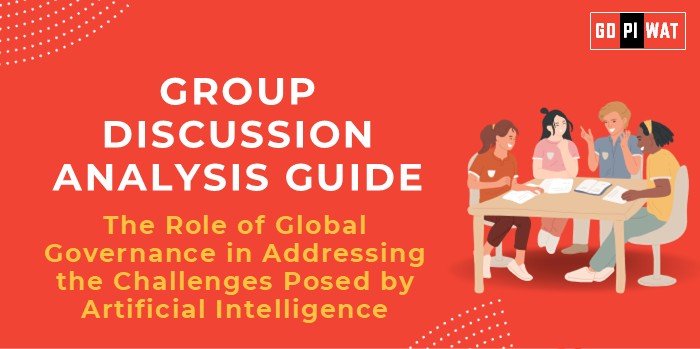📋 Group Discussion (GD) Analysis Guide
🤖 The Role of Global Governance in Addressing the Challenges Posed by Artificial Intelligence
💡 Introduction to the Topic
🌱 Opening Context: Artificial Intelligence (AI) has emerged as a transformative technology, influencing sectors like healthcare, finance, education, and defense. As AI’s capabilities grow, global governance becomes crucial to address challenges such as ethical misuse, bias, and economic inequality.
📜 Topic Background: The concept of global governance seeks cooperative frameworks among nations and institutions to address transnational issues. In AI, this involves ensuring fair deployment, reducing misuse risks, and fostering innovation responsibly. Recent efforts include the EU’s AI Act and UNESCO’s ethical AI principles.
📊 Quick Facts and Key Statistics
- 💵 AI Market Value: Estimated at $207 billion in 2023, projected to reach $1 trillion by 2030.
- 🌐 Global AI Use: 45% of companies globally use AI in some capacity.
- ⚖️ Bias in AI Systems: 63% of AI systems exhibit unintentional bias.
- 🌍 Global Regulations: Over 60 countries have AI-related policies, showcasing the need for global coordination.
🌍 Stakeholders and Their Roles
- 🏛️ Governments: Draft AI-specific regulations, enforce data privacy laws, and promote ethical AI standards.
- 🏢 Tech Companies: Innovate responsibly, ensure transparency in AI models, and address biases.
- 🌐 International Organizations: Create collaborative frameworks (e.g., UNESCO, OECD) for AI ethics and standards.
- 👥 Academia and Civil Society: Research AI impacts and advocate for ethical guidelines.
🏆 Achievements and Challenges
🌟 Achievements:
- ✔️ UNESCO’s AI Ethical Framework: Adopted by 193 countries.
- 📜 EU’s AI Act: Aiming for comprehensive AI regulation by 2025.
- ⚕️ Healthcare Breakthroughs: Significant advancements in disease diagnostics using AI.
⚠️ Challenges:
- ⚖️ Regulation Gaps: Lack of uniform global regulations and conflicting national approaches.
- 🚨 Ethical Concerns: Biases and human rights violations in AI systems.
- 🔐 Security Risks: Autonomous weaponry and misinformation campaigns.
🌍 Global Comparisons:
- ✅ Success: Canada’s Pan-Canadian AI Strategy emphasizes ethical AI and research funding.
- ❌ Challenges: In the US, fragmented regulations complicate AI governance.
📜 Case Studies:
- 🌟 EU’s AI Act: A success in harmonized AI regulations.
- ⚠️ Cambridge Analytica Scandal: Highlighting data misuse and regulatory gaps.
✨ Structured Arguments for Discussion
- 💬 Supporting Stance: “Global governance ensures a unified approach to addressing AI risks, promoting fairness, and preventing misuse.”
- ⚖️ Opposing Stance: “National interests and differing priorities make effective global governance impractical.”
- 🔄 Balanced Perspective: “While global governance is crucial, local policies must complement international frameworks for nuanced implementation.”
🎯 Effective Discussion Approaches
📖 Opening Approaches:
- 📊 “AI’s rapid advancements bring immense benefits but pose risks that demand global coordination.”
- 🌍 “The contrasting AI policies of China and the EU highlight the need for unified global standards.”
🔄 Counter-Argument Handling:
- ✔️ Recognize challenges in uniformity but stress shared benefits like ethical AI innovation and economic stability.
📈 Strategic Analysis of Strengths and Weaknesses
- 💪 Strengths: Drives collaboration, aligns standards, prevents conflicts.
- ⚠️ Weaknesses: Differing national interests, slow decision-making.
- 💡 Opportunities: Ethical leadership, innovation growth, human rights protection.
- 🚨 Threats: Cybersecurity risks, unequal AI benefits.
📚 Connecting with B-School Applications
- 🌟 Real-World Applications: AI in global operations management, ethical investments, and policymaking simulations.
- 💬 Sample Questions:
- “What lessons can AI governance draw from environmental agreements?”
- “How can businesses contribute to ethical AI deployment?”
- 📖 Insights for Students:
- Ethical AI innovations and leadership in tech governance.
- Strategy development for cross-border challenges.


